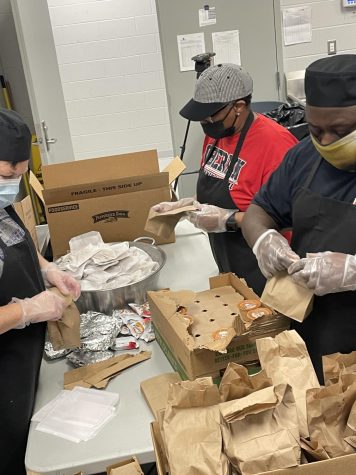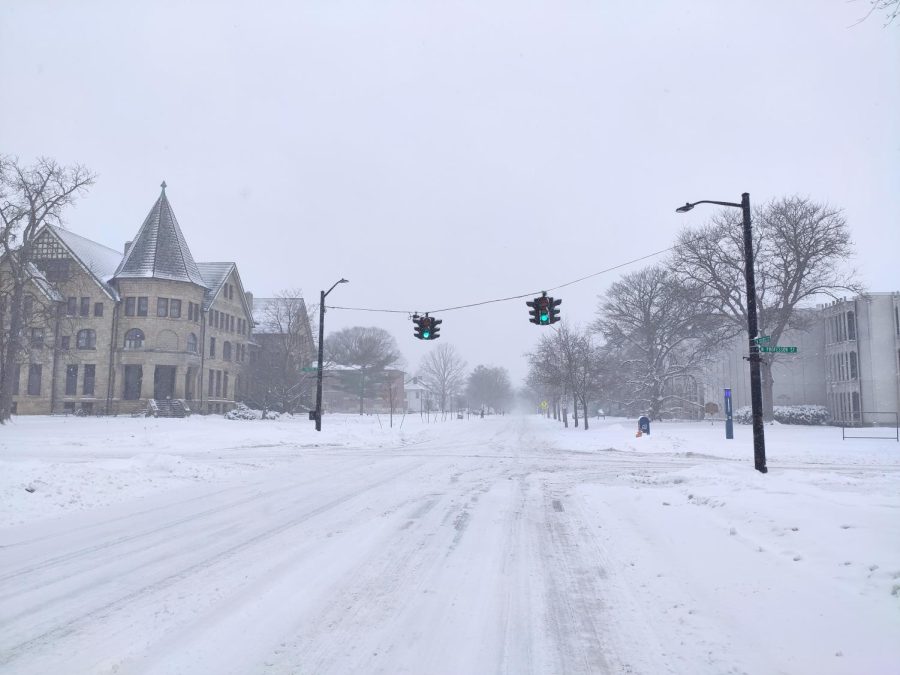Heavy Winter Storms Prompt Environmental Justice Efforts
Snow coated the College’s campus during the February 3–4 snowstorm.
Local organizations have been working over the last month to provide resources for low-income and other residents impacted by increasingly volatile winter storms. Providing Oberlin With Efficiency Responsibility, a nonprofit environmental justice organization, has worked to weatherize predominantly low-income residents’ homes, while Oberlin City Schools has developed pre-packed lunches.
While there have been several storms this winter, the most significant occurred at the beginning of February, when parts of Lorain County received as much as eight inches of snow. According to OCS Marketing and Communications Consultant Melissa Linebrink, superintendents across Lorain County had been watching the heavy storm before it battered the Great Lakes region with heavy snow, winds, and ice on Feb. 3–4.
Knowing that the storm would shut down operations for more than a day, OCS operations manager Jim Eibel worked with AVI Foodsystems, Oberlin College’s dining partner, to provide meals to any students that might need them. As 52 percent of OCS students are on the free or reduced lunch program, this proactive response allowed residents to weather the storm without fear of food insecurity.
“We knew that we were going to get hit with either the snow part of it or the ice part of it — either part of that was going to be detrimental for our families if they needed to get out to the store,” Linebrink said. “At the end of the day, all of our administration came together and decided that that price point — while it was $2,000 — was definitely worth it to make sure that our students had food security during those days and that they were kept safe.”
Cindy Frantz, professor of Psychology and Environmental Studies, and co-founder and board member of POWER, stated that with human-caused climate change, harsher, more frequent storms will likely hit in areas that have not historically experienced this kind of extreme weather. POWER works to provide residents with fully weatherized homes so that they can save money, lower their carbon footprint, and stay safe amid weather emergencies. This type of work is especially important for low-income residents, who, during these storms, have to make choices that threaten their life and safety.
“Energy efficiency helps protect people from these really extreme weather patterns that we’re going to be seeing more and more of,” Frantz said. “[POWER is] trying to reduce the carbon emissions of homes and is also making homes more comfortable — particularly for the low-income community. They wind up spending a huge proportion of their income on energy. If energy expenses are really, really high, people have this choice between: ‘Should I heat my house or should I feed my family?’”
POWER — which was formed in 2008 and receives funding from the City’s Sustainable Reserve Fund and the College’s Green Edge Fund — provides home efficiency grants to all Oberlin residents on an income- based sliding scale. According to its 2020 newsletter, homeowners who are below 150 percent of the Federal Poverty Level are eligible for Warm Choice, which covers the entire cost of insulating and weatherizing the home.
For more information see poweroberlin.org.






